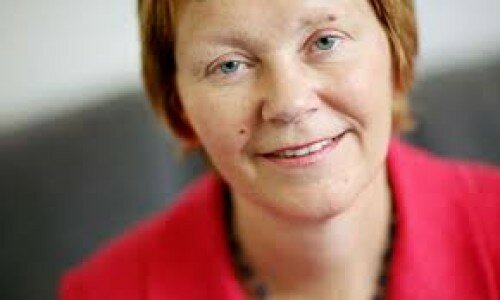
‘It’s good to talk’, improvement panel vice-chair tells political parties
A lack of cross-party working between the three main political parties is continuing to hold Birmingham back, the vice-chair of the city council improvement panel has warned.
Frances Done was surprised to discover that Labour, Conservative and Liberal Democrat councillors kept to their own groups and did not generally work together for the common good of Birmingham.
She said that although each of the political parties has its own room there was nowhere in the Council House for all councillors to congregate and talk through ideas, which was a mistake.
“The panel feels really strongly about cross-party working. There are some things the council does that should be based on cross-party decisions and then the council would work much better.
“I fully accept the realities of party politics, that’s democracy. But there are a great many things the council does and should be doing that really has nothing to do with politics.”
Ms Done told the audit committee that poor cross-party working and an absence of any proper member development training for councillors was a thread running through the Kerslake Review.
Member development programmes are now under way and all three party leaders, including Labour council leader John Clancy, are fully committed to cross-party working, she added.
The panel began its work early in 2015 and is charged with holding the council to account in delivering the Kerslake Recommendations. It reports directly to Communities Secretary Greg Clark.
Ms Done hinted at the centralised and top-down approach of the council under its former leader Sir Albert Bore, who was forced out by Labour councillors and stood down on December 1.
The first two letters from panel chair John Crabtree to Mr Clark during 2015 were highly critical of the council’s political leadership, which was said to not understand or even support the culture change demanded by Kerslake.
A third letter, written after Cllr Clancy took over as leader, pointed to a faster pace of change and a more constructive relationship between politicians and council officers.
Ms Done pointed out that copies of the first two letters were never distributed by the council leadership to backbench councillors. But the third letter was sent out automatically to all 120 councillors, indicating an “encouraging” more inclusive approach.
She questioned why the challenges posed by delivering the Kerslake recommendations were not added to the council’s risk register until July 2015 when the “huge risk” attached to non-delivery had been apparent since January.
She was also critical of the treatment of backbench councillors during 2015.
“People weren’t speaking out. There wasn’t much debate. A lot of members weren’t getting much information before they were expected to agree things.
“Now there is an absolute commitment from the three group leaders. They are encouraging members to really get stuck in.”
Ms Done said Kerslake was correct to point to a culture at the council where difficult decisions were ignored by politicians and senior officers. In particular, ignoring issues around equal pay claims which left the council facing a £1.2 billion bill amounted to a failure of leadership.
She added: “One of the things that is most interesting is equal pay and how it took so long before red flags were waved about.
“An audit committee raising issues like that in any organisation should rapidly result in concerns being escalated and taken up by senior management. The culture was that difficult issues didn’t surface.”
The improvement panel will make a further report to Mr Clark in March.
The Secretary of State will have to decide whether the council is on the road to reform or whether the panel should remain in place for a further period.
Ms Done said a crucial factor would be whether the council could agree a “coherent and deliverable” four-year financial strategy based on a further £250 million of budget cuts anticipated by 2020.
Veteran Labour councillor Carl Rice told Ms Done he was “ashamed” that it had been necessary to impose an improvement panel on Birmingham.
Cllr Rice, who joined the council in 1987, said: “I have been a councillor for a long time and seen the good, bad and ugly of local government politics. I feel really ashamed that you guys had to come in, not to teach us but to shake us up.”
He said one of the biggest problems was the power of “political patronage” in the hands of the council leader who could hand paid jobs to councillors who were then beholden on him for income.
“How can you be independent if you are always looking over your shoulder for your economic prosperity?
“The problem came about because the political environment got corrupted, not in a sense of money changing hands but political patronage.
“We should put structures in place with checks and balances so we individuals or groups of individuals don’t become all powerful.”
Similar Articles
PM: gave unlawful advice; frustrated Parliament
"Scenes." As young people would say, writes Kevin Johnson. "Unlawful." "Unequivocal." "Historical." These words are not,
WMCA: Nothing to see here…move along
As the Prime Minister prepared to address leaders ‘up North’ gathering for the Convention of
HS2: new driver needed
Is the Oakervee Review "welcome", "frustrating" or the end of the line for HS2, asks
Dawn goes Down Under
It might appear that Birmingham city council changes its chief executives more regularly than its
Who can beat the Street?
You could be forgiven for not realising we are in the foothills of the very










